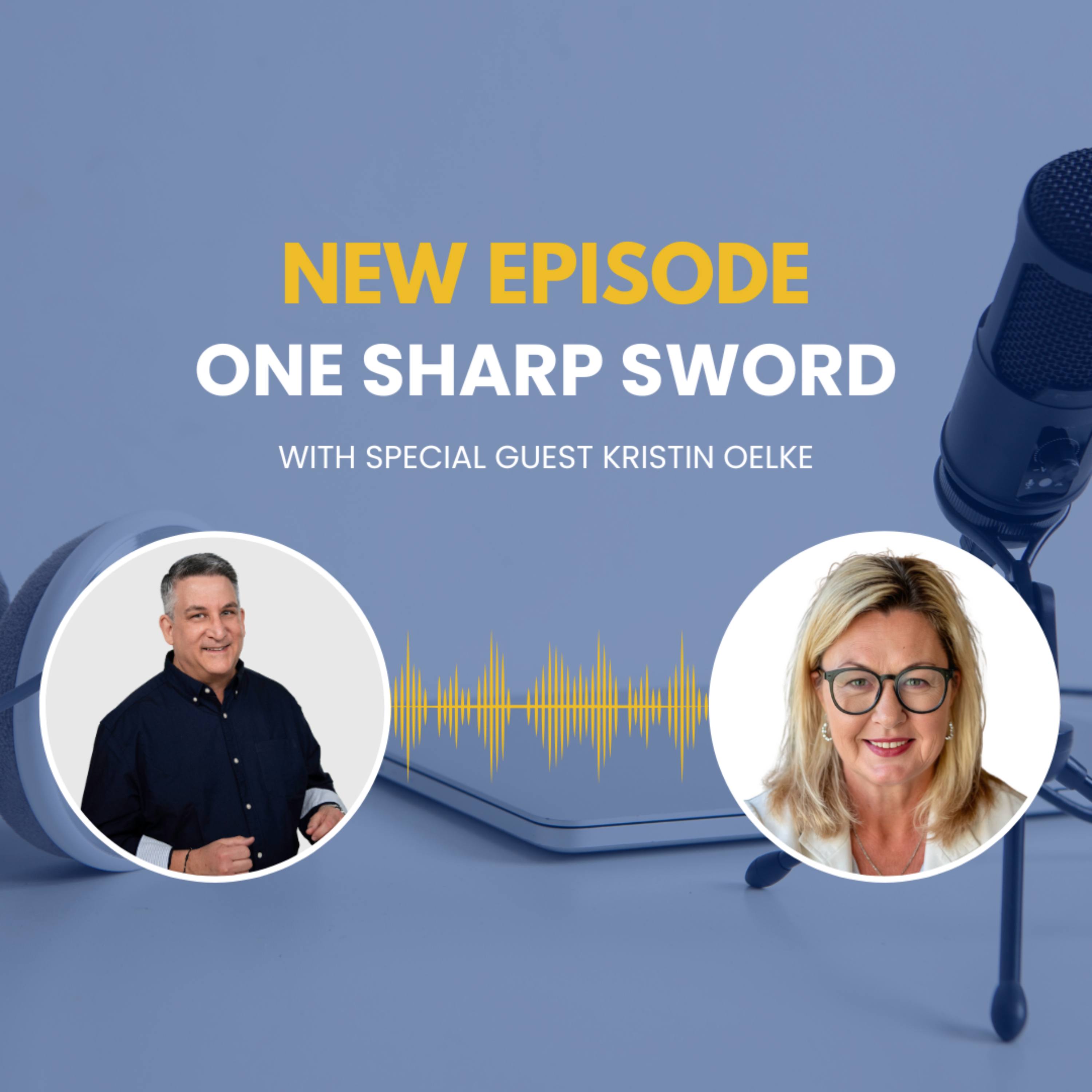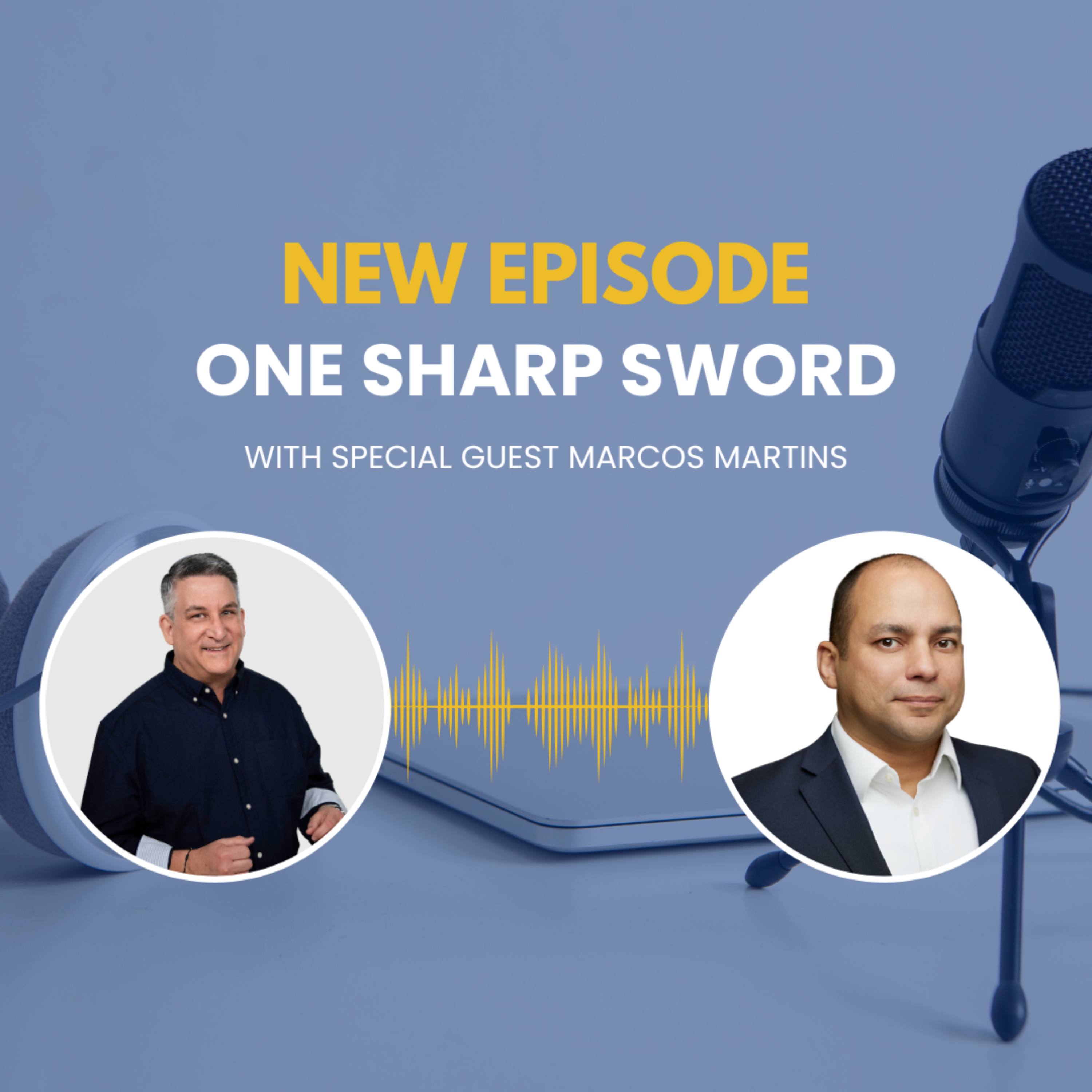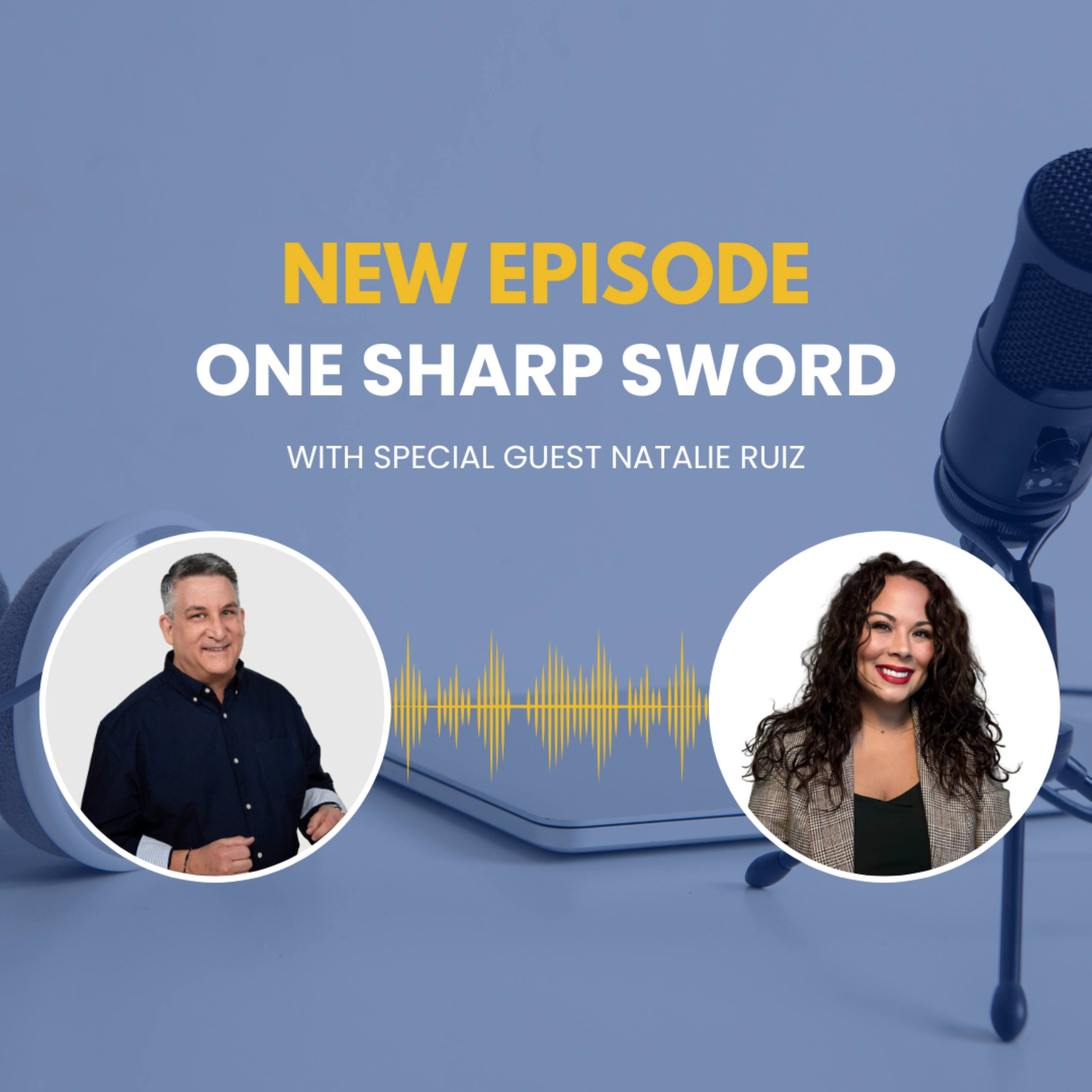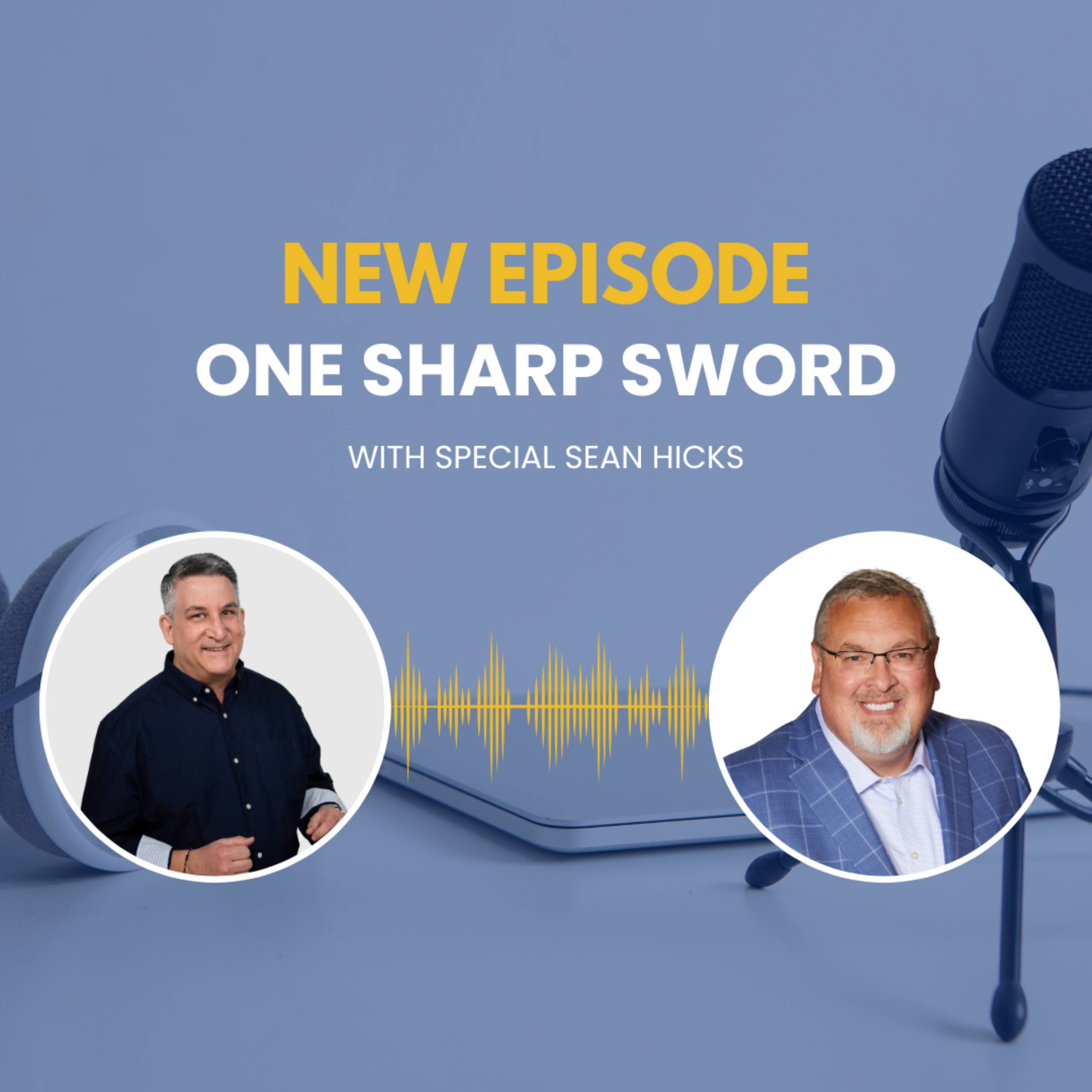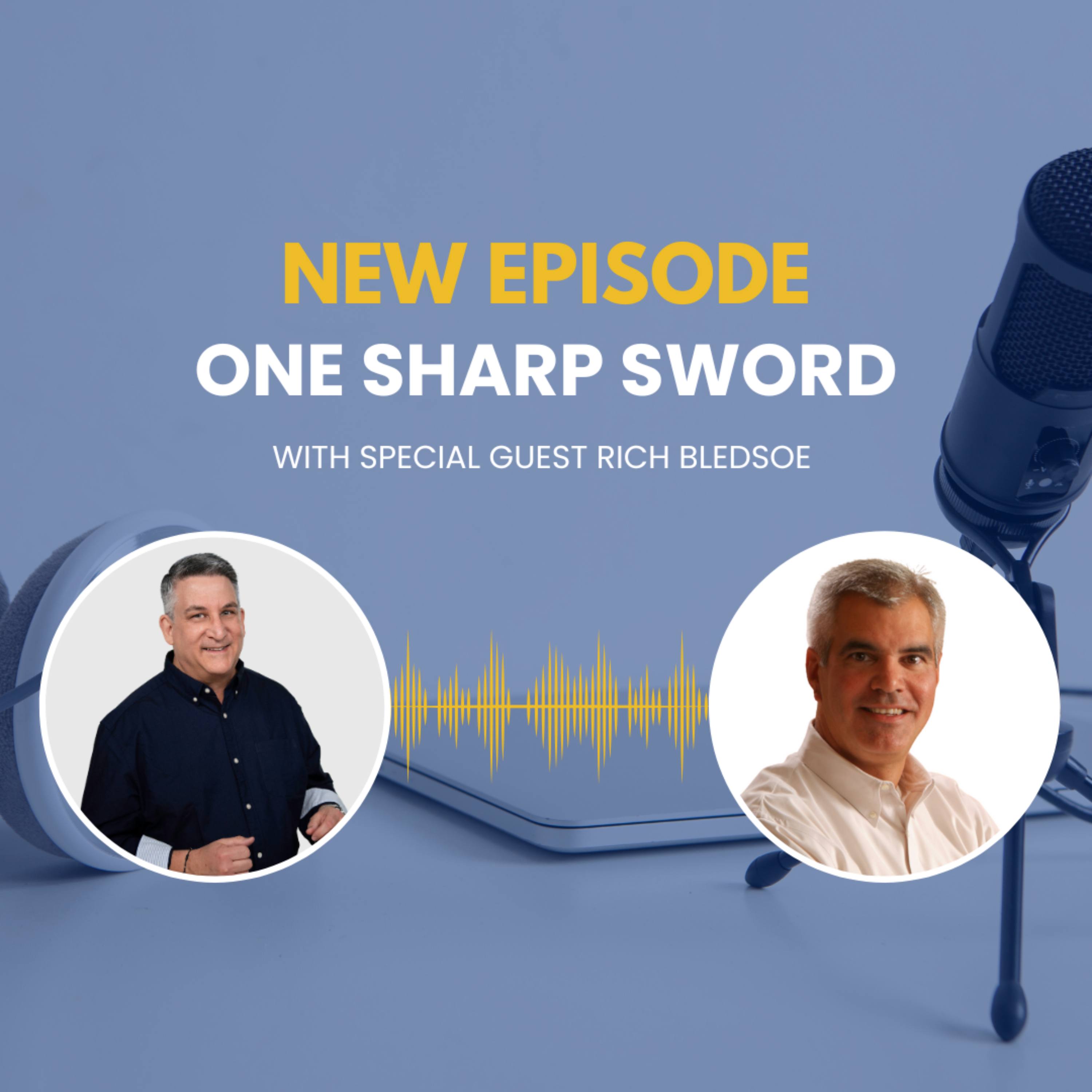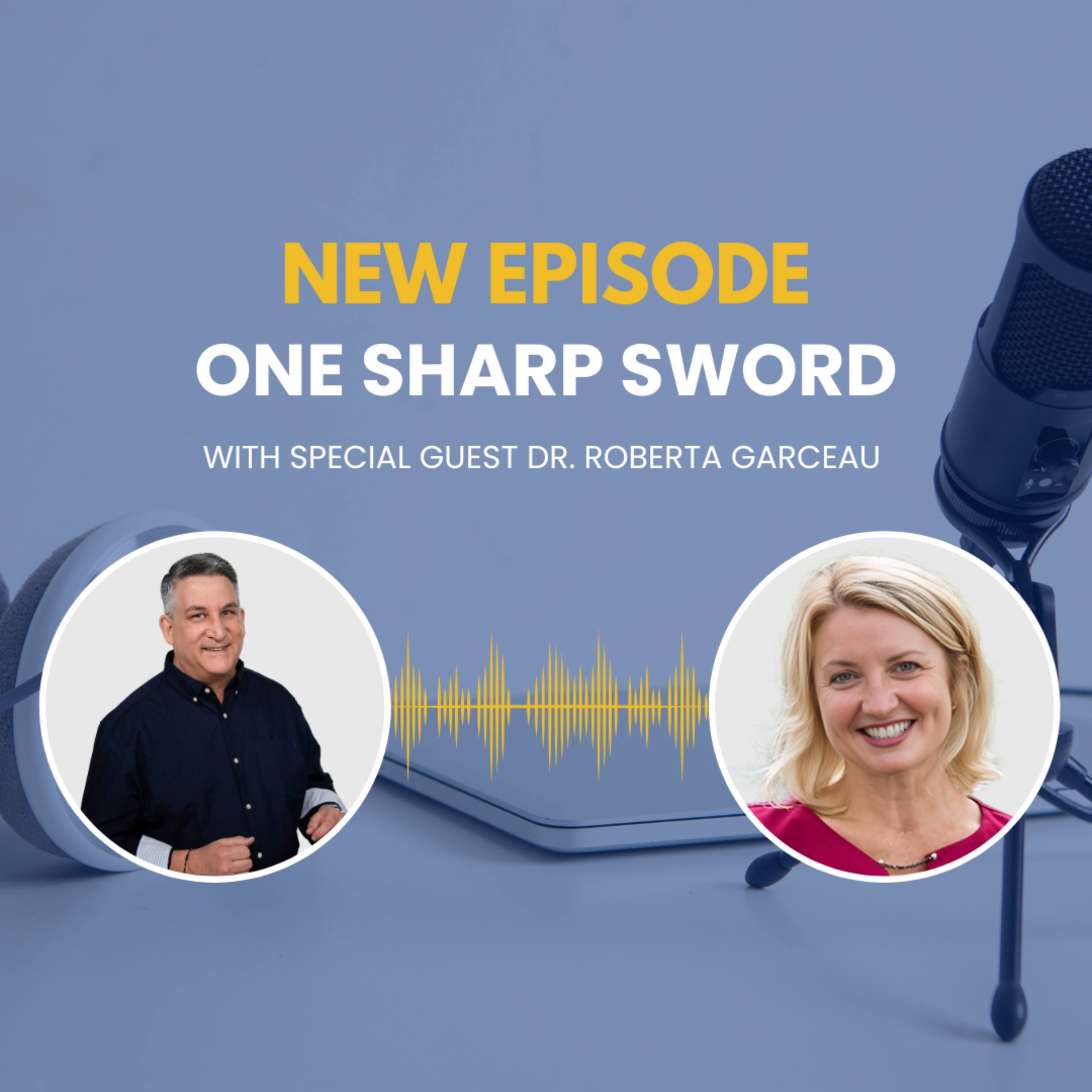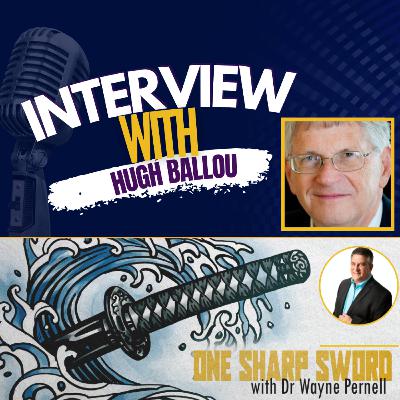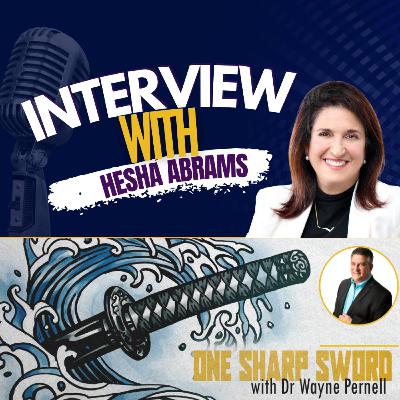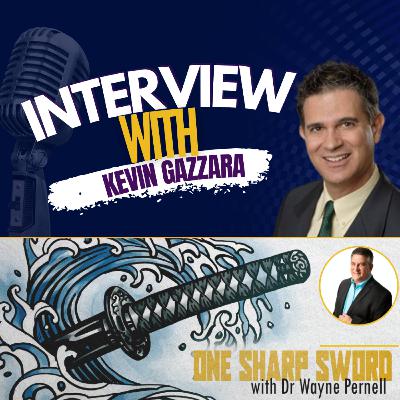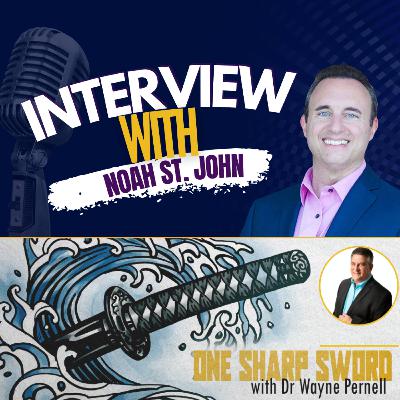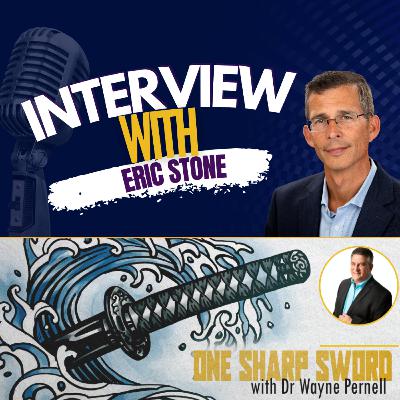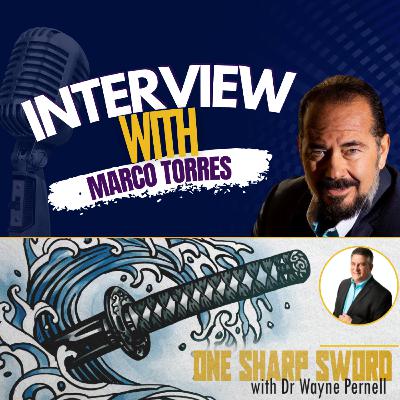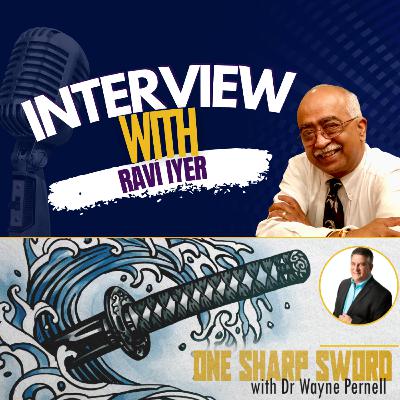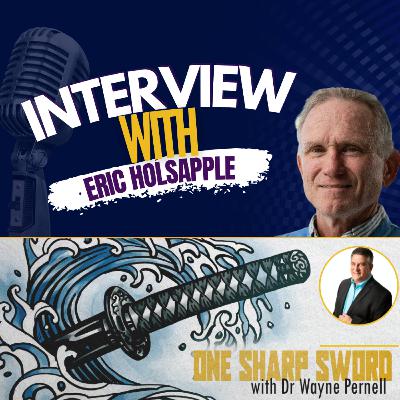Discover OneSharpSword
OneSharpSword

OneSharpSword
Author: Dr. Wayne Pernell, CEO and Founder, DynamicLeader, Inc.
Subscribed: 1Played: 16Subscribe
Share
Description
Most people live their lives using a dull blade, hoping to make it through to another day. Even a thousand dull blades would be no match for One Sharp Sword!
One Sharp Sword is about breaking free and cutting through the veil that holds us back from living fully into our own truth. Who would you be if you weren't listening to someone else's voice? What job or career path would you be on? Where might you be living? Who would you surround yourself with? What would you eat? What music would you listen to? Better still, what music would you play?
Dr. Pernell (also known as "Dr. P") brings you his insights and interviews guests who have had their own significant breakthroughs. Here, you're certain to come away inspired, ready to sharpen your sword. Be sure to get your weekly breakthrough with Dr. P, every Tuesday right here! One Sharp Sword!
187 Episodes
Reverse
Kristin Oelke is the CMO of Brightrose Ventures. She helps companies get back on track when things get messy. On our podcast today, we dive into what “messy” is and how to get out of it. We also talk about ● Curiosity ● Finding Purpose ● And how to be unafraid to try new things and Ask For Help! She notes that in organizations, you need to be looking at building culture by contributing to it, while also discerning what your leadership values are and whether you’re aligned with those values. Such a great interview with very human insights. Check it out!
What does a data geek and chief data analytics officer have to teach us about leadership? You’d be surprised! Marcos Martins brings amazing insight about his path from Brazil to leading wonderful teams in the U.S. He says he has a passion for solving problems and that the data tells the story. He invites the question of whether we ever have all the information we need - “we never have everything, but maybe you have enough.” He positions his success on several key factors - ● Problems can be solved (See problems as puzzles) ● For each goal list, be determined to deliver to your stakeholders and to learn something new ● Get in partnership with your team members and become more likable and trustworthy ● Stay flexible, adaptable, persistent, and consistent Marcos can be found on LinkedIn and welcomes the connection.
Natalie Ruiz didn’t wake up one day and decide to become the CEO of AnswerConnect, an answering service firm dedicated to staying human. Nope. She was looking for what she describes as an easy, non-burnout, job. She started with the company as a temp and 20 years later is running it. Her journey began by telling the truth to the then-CEO about what she saw as obstacles to excellent service delivery. Well, he asked and she didn’t hold back. Conversations grew from there and the rest are leadership lessons you’ll find along the way. Listen here and check out AnswerConnect.com
Leadership lessons come from a wide array of experiences. When a man well versed with service and protecting consumers found that his industry was shifting, he carved his own niche. Meet Sean Hicks, the CEO and co-owner of New Leaf Service Contracts. Service contracts can be interesting? They can. But that’s not what we talk about here. It’s the man who sees them through to the companies who present them that’s pretty interesting. Watch what Sean and I have to say about leadership, culture, and service. Check out this podcast. And check out what Sean and his team offer at www.NewLeafSC.net
In this powerful episode of One Sharp Sword, Dr. Wayne Pernell welcomes leadership veteran Rich Bledsoe, whose journey from vocational school tinkerer to senior vice president of a multinational corporation is anything but ordinary. Rich shares how growing up with limited means helped shape his drive for excellence, both professionally and personally. He talks about embracing opportunity, even when it veers from your plan, and how mentorship—both received and given—has been a key factor in his leadership evolution. Through personal stories about guiding his children, repositioning team members to thrive, and confronting his own growth edges, Rich reveals what it really means to lead with purpose and clarity. The conversation also dives into pivotal coaching moments between Wayne and Rich, including how to navigate difficult relationships at the executive level, lean into your strengths, and develop a leadership philosophy grounded in integrity, accountability, and continuous improvement. Rich reflects on learning piano in retirement, making peace with being a “field general,” and his commitment to lifting others through mentorship. Whether you're an emerging leader or a seasoned executive, this episode delivers timeless lessons about growth, humility, and redefining excellence at every stage of life.
What if your stress, your “I’m fine,” and your daily grind were actually symptoms of something deeper—dis-ease, not ease? What if there was a way to live with more joy, more vitality, and yes… more bliss? Dr. Roberta Garceau joins me to share the heart of her new book, Bliss, Not Burnout, and her powerful message for anyone stuck in survival mode. We talk about thriving—not just getting by—and how you can reconnect with what matters most. Key points in this episode: • Elemental Wellness • Embodied Self-Awareness • Tools You Can Actually Use (Right Away) You’ll hear how ancient wisdom from Ayurveda blends beautifully with practical, real-world tools that fit your busy life. We also dive into Roberta’s personal growth journey—from dentistry to author, speaker, and wellness leader—and how coaching helped her think bigger, stretch further, and show up more powerfully in the world. She didn’t stop at “good enough.” And you don’t have to either. If you’re feeling like burnout is creeping in, this conversation will open up something new for you. Find Dr. Roberta Garceau at drrobertagarceau.com, on LinkedIn, or follow her weekly yoga-inspired wellness tips on Instagram and Facebook (@MyYogaJoy).
From the c-suite to executive leadership coach and author, Emily Sander was a pleasure to have join me on One Sharp Sword.
Superman is Emily’s favorite Superhero. As with Clark Kent, Emily is adopted. She also uses - and encourages others to use - the superpowers for good and to never give up.
She enjoyed business and leadership and especially loves 1:1 interactions where small points of leverage make a huge difference.
Emily notes that the #1 skill someone can have is communication. And, with that skill comes the adaptability about both listening and conveying information to the person or people in front of you, each of whom likely have a different style from you. Huge leadership tidbit, here!
She notes that many execs (I’d say almost all) hit a point of questioning what it’s all for.
We discussed the existential dilemma which brought us down a great rabbit hole worth exploring!
Skill for self: Be deliberate and avoid distractions.
Emily provides us with food for thought noting that we need to question whether in putting things off for someday or “one day,” is it one day or day one? Again, be deliberate!
Books -
Hacking Executive Leadership
An Insider’s Perspective on the Chief of Staff
Private Equity Investments
Find Emily Sander on LinkedIn and be sure to check out her books and her coaching offerings at www.NextLevel.Coach
GREAT conversation with Alain today. From the culture he grew up with to how he guides leaders today, you’ll get a lot out of listening.
His three Cs are key to leadership, whether at home or in your organization:
Connection
Communication
Collaboration
And he spoke of Consistency, which I’d call a 4th C in his model.
Alain’s book Cracking the Leadership Code is worth picking up!
We connect as human beings. Our world demands people who can think and co-create within an organization.
Leaders must find a way to convey that each employee feels valued and cared for. That’s how you get real connection.
Communication is about creating shared, mutual understanding. If you assume that the default is that what is being communicated will be misunderstood, what will you need to do to ensure true understanding?
Collaboration means creating the culture together by asking the question of what gets the BEST out of people.
In the interview, we discussed the graying of the workforce, mentorship, and remote work. Super interesting!
Consistency counts and so does actively seeking feedback (so that you can get better).
Think about this, too. It’s called the Fundamental Attribution Error: We justify our actions based on our intentions. Others judge us based on the outcomes and results.
Find Alain Hunkins on LinkedIn and visit www.AlainHunkins.com for more!
Please LIKE, COMMENT, AND SHARE this with your friends and colleagues!
A performance coach coming from the corporate sector who, after reflecting on what he wished he had been taught, Aaron Trahan set out on his path as a coach. He now helps others in leadership roles.
He notes that complacency must be met head on. Current success could block your future success if you allow yourself to get too comfortable.
While it’s easy to get comfortable, he also knows that no one says that they don’t want to get better results.
The remedy: Get a bit uncomfortable. That discomfort is you stepping out of your comfort zone.
The biggest thing that stops people - they think they have to be ready or that they have to do things perfectly. Forget perfect. Start. Take imperfect.
Aaron’s five-level methodology demands strength at each level:
Mindset - you need to believe that more is actually possible for you
Awareness -
Clarity -
Vision, Milestones, Goals
Accountability
Take action.
Test your “why.”
Filter what is IN and what is a distraction.
Focus and Attention correlates with Speed and Progress
Check out more at www.PerformanceMindsetCoaching.co
What does a musician and conductor know about leadership? My guest, Hugh Ballou, sees his work at conducting transformations. He defines what leadership is and isn’t and what components go into great leadership. His company, SynerVision is a crossover between synergy and vision. Here are some key points. Listen in for more!
Leadership isn’t dictatorship - the leader is an influencer!
In an orchestra, the leader knows the score and everyone playing knows their part
Infrastructure is everything, what you’re playing is almost secondary
It all comes together - through practice, performance, clarity, and community
BIG LEADERSHIP LESSON: Rather than tell people what to do, state your expectation and your availability to mentor. THIS IS A PARENTING TIP, TOO. (Just be sure you’re walking the talk and not asking others to do as you say, not as you do.)
THE CULTURE IS A REFLECTION of the leader!
Rehearse Excellence
Four foundational leadership principles:
Vision = The Score
Be ready to articulate the vision
Relationships and Building a Team
Hire The Best
Systems - create systems that help your team do their jobs
That includes the way you run meetings (bad meetings kill productivity)
Value the Rests
You can’t drive and push all the time. You’ve got to create emphatic balance through clarifying punctuation.
Find more about Hugh at:
www.AboutHugh.com
www.HughBallou.com
And for a free, 31-day leadership program, 5 minutes/day, go to www.BetterLeader.me
Can you get excited about conflict?
There’s an old movie from 1950 that caught my attention. It predates me, but still enchanted me. The play-turned-movie is Harvey. The main character, Elmer P. Dowd, finds people in an uproar talking about what he believes in. Elmer’s response, “Oh an element of conflict in any discussion is a very good thing. It shows everybody is taking part and nobody is left out. I like that.”
Hesha Abrams is an attorney-turned-mediator, something she’s done for the past three decades. Her wisdom is epic and has lessons we can all learn from.
Conflict resolution has shortcuts. Mediation is about talking to work out deals. The idea of “win-win” doesn’t work because there’s all too often someone’s ego involved. There’s either fear or a desire to dominate. That never makes for an equitable win-win. Logic, reason, and rationale do not solve problems.
Key points from this episode with Hesha Abrams:
Problems are solved at an emotional level.
Even economic decisions are managed emotionally
People might not be playing to win, but they ARE playing not to lose. (Note: think about that for your own life)
Some people want to be right; most people do not want to be wrong. (The embarrassment might imply being outcast and ultimately alone.)
Look for/listen for the power dynamic in any interaction
Language matters -
Request permission
Ask if the other person would “like” what you’re offering
“May I share a story with you? Would you like it if I shared….”
Look for where it becomes okay to make a deal
Interrupt strategically: “Do you know what I like/respect/admire about you?”
Name the emotion
Validate
Turn on the give-a-darn meter
Empower by taking responsibility. Apologize. Request a “do-over.” This gives the other person the power to say yes and allows you to model a culture that you value.
Hesha and her resources may be found at:
website: www.HoldingTheCalm.com And her book: HOLDING THE CALM
website: www.heshaabramsmediation.com
LinkedIn: hesha-abrams-esq https://www.linkedin.com/in/hesha-abrams-esq/
Facebook: HeshaAbramsHoldingTheCalm https://www.facebook.com/HeshaAbramsHoldingTheCalm
You Tube Channel: https://www.youtube.com/channel/UCPcPngGiIF-GlC8w1l3sH8A
Having grown up in PA, Dr. Kevin Gazzara had a propensity for taking things apart and putting them back together, it was a natural curiosity that drove him. He found himself organizing events for his friends. And what do you get when you have a curious kid who likes to organize? A focus on business and engineering.
After decades with Intel and other organizations, Kevin took to entrepreneurship. He became an executive coach, putting his experience to great use. His focus: productivity and building teams.
He believes in action learning, engaging those he teaches to have immediate, practical impact. He looks at six key areas:
Behavioral styles
Communication and conflict
Values and guiding people to their natural place of Flow
Critical Thinking (so absent and so important these days)
Leadership Styles
Motivation & Engagement - here, he notes that you cannot motivate someone else. You can create the circumstances or environment that helps them to feel motivated.
Pain Points in most organizations include:
Retention (and Kevin notes that this starts with hiring correctly)
Motivation (and here, Kevin suggests asking a couple of questions so that rewards are unique to the individual - I’d add that this crosses over to family, as well)
What three things might you like as recognition (surprise, when you really dig, you’ll find it’s not money as #1)
How do you like that delivered, publicly or privately?
And a caution NOT to overuse recognition.
Leadership and management lessons can cross over to parenting if you think about it. I like to build that bridge. We want to build upon values and create autonomy by building mastery and purpose. Along the way, there’s accountability.
The lessons here are great for everyone, from leaders to family members!
Check out The Leader of Oz (Kevin’s book) at www.Coachsultants.com
Kevin and his team can be found at https://MagnaLeadership.com and Positive Intelligence info is at https://PQTrainingAndCoaching.com
And be sure to look for a special gift at www.MagnaLeader.co/GIFT (GIFT is all caps)
What’s the ONLY thing you need to know about my guest this episode? Roy Osing is the ONLY author, entrepreneur, and executive leader who delivers practical and proven “audacious and unheard-of ways” to produce high-performing businesses and successful careers.
His focus is on helping build what he calls The ONLY Statement, identifying what makes each individual or business stand out above everyone else. The key here is that if you claim to be The Only one doing something, you’ve basically owned that field.
His brand (website, book, etc.) is www.BeDifferentOrBeDead.com focuses on differentiation. Roy notes that you have to learn to satisfy clothes in a way that matters to them. Figure out what you need to do “in a superlative way.”
In terms of the norm, common, average, or herd-mentality way, you can either comply with or confront that flow. Roy and I agree that it’s exceptionally important for business leaders and, truly any of us as individuals, to find that natural expression of self.
While he doesn’t call it this, what his approach gets back to is First Principles: that is, if we look at the current situation and started over with our thinking, not knowing what we know about what society expects of us, how would we approach this for the best possible outcome? How can we do this (whatever “this” is) differently?
I created a bridge in our discussion, noting that this question lands as exceptionally important both in business and in your personal relationships, as well. This is what Roy calls the “Be Different lens.”
As you look at being different, it’s important to recognize you can niche way down and still have a great business. Roy invites you, the listener, to decide who you’re going to serve (aka, the Target Market). And again, building a bridge from the business world to your home life, that could be a family member (partner, parent, child, etc.).
Then determine what they CRAVE, not what they need. You can, of course take care of the basic needs. And once done, “you’ve earned the right to dazzle.”
THE ONLY Statement and Strategic Game Planning Process is done relatively quickly.
How big do you want to be in 24-months (24 thirty-day periods)?
Where do you make your money? That is, who will you serve and what do they crave?
Remember, you need to stop thinking about the product or service you offer and focus on what your market needs and craves.
Create The Only statement to compete and win in your customer groups.
Find Roy at www.BeDifferentOrBeDead.com and at Roy.Osing@gmail.com
I often have guests with a similar focus to mine as a way to look at differing approaches. Noah St. John has a great message and has managed to distill it into multiple columns, maximizing how that message gets out.
He’s a best selling author, a speaker, and an executive coach. And, his results are undeniable.
He went from living literally dirt-poor while growing up to becoming a multi-millionaire by helping others become successful.
He bounced from a suicide attempt to finding his purpose. He’s a writer and a synthesizer of information. He looks for the missing pieces of information that’s out there and offers those in frameworks that anyone can learn from.
His offerings include Power Habits (a book and online course) focusing on the subconscious habits of successful people. One habit he shared with the audience is Asking Empowering Questions (something I discussed in my blog about a year ago, so super important to dive into). There’s a difference between affirmations and asking positive/empowering questions of your subconscious.
He offers his Seven Figure Expert book for free (just pay his shipping charges) at www.SevenFigureExpertBook.com
Here, he discusses the inner game and the outer game for selling your guidance as a service. Work on your mindset, then work on your offers, funnels, and getting traffic.
And Noah invites you to set up a consultation with him at www.BreakThroughWithNoah.com
And learn more about him and his offerings at www.NoahStJohn.com
From an entry level position at Enterprise Rental Car spanning over two and a half decades when he left the company as the Regional Vice President, Eric Stone learned a thing or two about CULTURE.
Through engagement and other key steps, you create Culture Carriers. Look at:
Time Management and Eisenhower’s grid demarcations of Delegate, Do, Defer, or Delete
Hiring Practices to include focusing on attitude, effort, and coachability
Hold regular meetings to highlight desired outcomes, then back fill the calendar with times for training and review.
Remember that beliefs lead to behaviors.
Identify your priorities and keep them in front of your team members.
Remember that 40% of your team don’t actually know what’s expected of them.
In exploring corporate culture, investigate the gap between Values and Behavior.
Whether working in-office, remotely, or hybrid, there are five factors of engagement that need to be focused on:
Relationship with the manager
Understanding of requirements
Having and utilizing the proper tools and tech
Personal and Professional Development
Reward systems
Because there’s no pressure relief for those working remotely (and hybrid/remote), the stress and anger felt on one day could well carry over to the next day. Leaders need to be the pressure-relief and support.
Calendar time for engagement; that’s the core of leadership
Explore, “What works? And what can we do better?”
Measure workplace culture via:
Engagement
Experience
Ethics & Behavior balanced against Values
Sales
Retention
Growth
FRAMEWORK of the Hourglass
Discovery - pull information
Orchestrate - formulate and roll out priorities
Training
Assessment & Measurement
Balance Mission, Vision, and Values against Policies and Procedures
Find Eric Stone on Linked In and Instagram (ClearPathVentures_) and pick up his book Jumpstart Your Workplace Culture wherever books are sold!
Marco Torres grew up in the Caribbean as his father ran GE Credit Corp from Puerto Rico. He learned about adventure and entrepreneurship. At 12 y/o he was featured in the news for having the largest paper route in the area. 11 years later, with his brother and mother, he opened a series of restaurants. And a couple years after that opened a nightclub. His realization: he wanted to employ others more than be employed by others. While formal schooling was never his thing, as an entrepreneur, continuous learning is a necessity! He notes, “be a student first!” So what makes Marco different and what is this Marketing Boost thing? At the risk of part of this episode sounding like a fascinating infomercial, Marco’s business is helping people add value to their offers. His company essentially offers travel perks that others (like you and I) can subscribe to in order to give ourselves, our family members, our clients, and our prospects the gift of free hotel stays (or restaurant outings). Imagine this, “When you buy my xyz, you’ll also get three nights’ accommodation (less travel and taxes) at this ____ amazing hotel.” There’s something to that and it got me thinking. I hope you enjoy this episode as much as I enjoyed talking with Marco Torres. To learn more about him, go to www.MarketingBoostSolutions.com for a link to a free (limited) trial of his services. (I’m not affiliated with Marco Torres or his Marketing Boost program in any way, so I receive no compensation or any other perks. I only recommend him because the program sounds interesting. No, I haven’t tried it yet myself. I will, and at the time of this writing, I haven’t.) By the way, have you checked out my masterclass on getting from Desire to Destination? I call it my PowerfulPresence masterclass! Check it out HERE
So an MD with ADHD walks into… actually, what happens is that the gentleman creates so much presence that time flies and people feel connected. How? Breathing into presence, breathing out ego. Dr Iyer is based in Virginia (via India). He’s writing a new book about neurodiversity, autism, and sensory processing disorders which he refers to as types of personality, not disorders. He also wrote a book called The Reaper’s Dance about how we found our humanity in the midst of the COVID pandemic, coming face-to-face with our own mortality. He calls that time “a phenomenal global experiment.” Influenced by Brunton’s Search In Secret books, Ravi found comfort in some to the breathing exercises that helped quiet his mind AND open him to non-judgmental experience. He found his path to NOW. That is, staying in The Now. Consciousness consists of our ability to perceive experience and our ability to create a narrative about the experience. True personal power comes from choosing which narrative to pay attention to. Grounding comes from watching The Tide Of Your Breath - take note of the deepest place in your chest for the inhale and note about where your breath extends in the exhale. Practice that and see how your focus sharpens. The ability to get grounded is foundational to success. Find Dr. Ravi Iyer, his book(s), and other resources at https://www.DrIyer.com
Eric Holsapple is an expert on mindful leadership. He shares his wisdom with us noting the importance of presence, especially as a leader. And that’s why I invited him to One Sharp Sword. It’s important work. When you can be mindful and truly present, especially in our distraction-based world, you make a difference in the people around you, your organization, and potentially the world. Eric invites us to reflect internally and think about the vision we have of ourselves and for our future. He notes that to create a different future, we might need a different self-concept and that is created through habits. Key points: • Mindfulness is focus. If I’m judging, I’m not focused; I’ve already made a decision. • Don’t just let your body carry your head to a meeting. Integrate. • Mindfulness becomes a culture (a way of being) AND a strategy. • You’re not your job, you have a job. • Self-esteem can come from humility, not from positional power. • Intention moves things. • Profit is the result of purpose. Be present and practice mindfulness… Seriously, practice. Take just two minutes to allow yourself to focus on something, anything, and not let distractions intrude. Find Eric Holsapple on LinkedIn. Look for his program: 12 Pillars of Mindful Leadership and pick up his book: Profit with Presence More info about Eric and his programs can be found at https://LivingInTheGap.org And please like, rate, and share this episode! See you here next time!
Ahhhhh Geek Out (he says he’s more of a nerd than a geek, so…) Process Mapping is a thing! It’s the efficient, distilled, visual representation of data, the structured capture of process data. And while that doesn’t sound like a riveting thing to talk about, I assure you, this episode was filled with nuggets you can use in your business and personal life. Key points to listen for: • Have a foundational start point • Communicate - and look for the multiple ways that things are communicated in each of your systems (at work, in multiple communities, and at home) • Visual representations of processes give consciousness to businesses • ChatGPT compiles data to answer questions while Sam’s company www.Truvle.com, structures the process data it compiles Find Sam Druschak on LinkedIn or at www.Truvle.com
From Amazon Exec in the early, scrappy days to leadership and strategic consultant, John Rossman’s insights are of tremendous value for anyone in a place of looking at, and impacting their organization. He notes that dissatisfied customers are a gift. This prompted a conversation about curiosity and the need to be open enough to ask for further feedback. Step into customer obsession and really explore who you’re there to serve. Keys to success (among many) include: • Patience AND • Urgency about the things you can control and not worrying about the things you can’t Be sure to check out John Rossman’s books: The Amazon Way - 14 leadership principles and Big Bet, available on Kindle in February. Go to www.BigBetLeadership.com for a special giveaway! Other lessons from today’s episode: • Be willing to have a hypothesis that could be proven wrong (this is the Big Bet Vector) • Innovation means looking at doing things differently and not being satisfied in doing well doing what we do well • Leadership must create a balance of creating high performing teams and empathy • Winning is about: º Do your customers love you and have loyalty, or will they move if a better price comes along? (Metrics: great NetPromoter score) º Is it a great place to be a team member? º Does your financial model justify the business? Find John Rossman on LinkedIn and at www.BigBetLeadership.com


